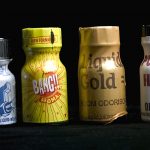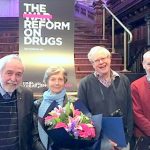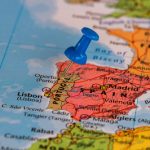Keep Poppers Legal: An Interview With the Nitrite Group’s Paul Kidd

The Therapeutic Goods Administration (TGA) released an interim decision last year that would see amyl nitrite and other alkyl nitrite inhalants banned. This means these substances popularly referred to as poppers would be moved into schedule 9 of the Poisons Standard along with drugs like heroin.
The use of nitrite inhalants is popular amongst gay and bisexual men as it enables and enhances sex for receptive partners. These substances are a source of nitric oxide, which, when inhaled, leads to the relaxation of involuntary muscles.
The banning of these inhalant products is under consideration as eye doctors in Australia have reported an increase in people presenting with temporary and permanent eye damage, which has been linked to the use of nitrite inhalants.
The TGA was set to hand down its final decision on poppers at the end of November. However, in a move not often made by the regulatory body, the final decision has been postponed and the consultation period extended due to strong public outcry against the ban.
Criminalisation is unjustified
Currently, it’s technically illegal to sell poppers in this country. But, they are available for purchase over the counter in adult shops, where they’re sold as leather cleaner or room deodoriser. Popular brands include Rush, Jungle Juice and Ram.
Critics of the ban assert that rather than outlawing these products, there should be a focus on greater regulation, as well as improved education about the risks involved around their use. Poppers aren’t poisonous if inhaled, but if they’re swallowed, they can cause death.
Australian Drug Law Reform Foundation president Dr Alex Wodak said last September that banning nitrite inhalants would push them onto the black market, where they’d become more dangerous due to the lack of quality control involved with illegal production.
A similar poppers ban was rejected in the UK back in 2016, after it was vehemently opposed by the gay community. The British Advisory Body on the Misuse of Drugs found that they were “not seen to be capable of having harmful effects sufficient to constitute a societal problem.”
Regulation is the way
The TGA is holding two public meetings that will consider “appropriate access and safety controls of alkyl nitrites”. One will be held in Sydney on 31 January and another in Melbourne on 7 February. The final decision will be made after these. And submissions regarding the ban closed on 15 January.
The Nitrite Group was vocal in encouraging those in the LGBTIQ community who’d be affected by the ban to make submissions in opposition to it. Formed in response to the proposed rescheduling, the group produced an alkyl nitrites guide to help others with their submissions.
Sydney Criminal Lawyers spoke with Nitrite Group member Paul Kidd about the importance of poppers for gay and bisexual men, his group’s assessment of the harms associated with their use, and why regulation is a better avenue to take than criminalisation.
Firstly, the TGA is considering banning the use of nitrite inhalants in this country. You’ve formed the Nitrite Group to campaign against the ban. Mr Kidd, how popular is the use of poppers amongst the LGBTIQ community? And why is its use of such importance?
There are social research surveys that are done regularly in the gay, lesbian, bisexual and transgender community.
In particular, we have the Sydney and Melbourne Gay Community Periodic Surveys and there’s another one called Flux. They ask people specifically about their use of these products, which are called poppers.
The numbers vary between the surveys, but roughly about 45 percent of gay and bisexual men who answer the questions say that they’ve used poppers at least once in the last six months.
We think that comes out to about 90,000 gay and bisexual men, and other members of the LGBTI community, who use these products occasionally, at least once or twice a year.
A very large number of gay and bisexual men in particular use it. The reason that the product is used is because it makes receptive anal sex easier, more comfortable and more pleasurable.
Now, anal sex is not something that everyone is into, but obviously, it’s a really important part of the sexual practice of gay and bi men. And it can be really difficult for some people. It can be uncomfortable and painful.
People may have anxiety around that, which actually makes it more difficult to have comfortable and pleasurable sex. And this is a product that is really effective in facilitating that.
So, what alkyl nitrites do when they’re inhaled is, they cause the smooth muscles in the body to relax and one of those muscles is the inner sphincter. And that’s not a muscle that you can voluntarily relax. It can be hard for people to relax enough to have receptive anal sex.
Poppers are one way people can do that. There’s no other type of medical product or other product that works as well, and as effectively.
It has been positively used by gay men for at least 40 years, maybe as long as 50 years. It was originally used as a treatment for angina and somebody discovered it was also very good for this purpose. And they’re quite commonly used.
The TGA has stated that it’s considering outlawing these substances because a number of eye specialists have reported an increase in retinal damage linked to nitrite inhalants.
What do you say in regard to retinal damage and other harms that might be associated with nitrite inhalants?
As I said, these products are widely used. The number of adverse effects that are reported are actually very small. Globally, there’s been very few deaths. There’s only been about 17 deaths in 30 or 40 years that have been reported in the literature.
When the initial decision was published, our group did a literature search and review to try and identify what was going on with the ophthalmic problems that have been reported.
And what we found is that there certainly are reports of people who do suffer from a condition called poppers maculopathy. That can lead to at least temporary vision problems. And it can be permanent with some people.
The number of cases is really small. We don’t know how many cases there have been in Australia. The TGA decision doesn’t provide that information. And when we’ve looked at published research, there are just a tiny number of cases globally.
Something that we observed when we did the research was that the number of cases spiked after the European Union banned one form of poppers in 2008. That was a product called isobutyl nitrite, which is one of the various products that are used as poppers.
And when those were banned in the EU, the manufactures substituted it for a different product called isopropyl nitrite. We think the evidence shows clearly that it is actually isopropyl nitrite – just one of these products – that’s responsible for the vast majority, if not all of the cases of poppers maculopathy.
We think the TGA can respond to that by dealing with just that one product. And that’s a product that is not very commonly sold as poppers in Australia. Most of the poppers in Australia are different chemicals. And these are chemicals that we think are relatively safe according to our review.
Can you outline your group’s argument for keeping nitrite inhalants available that was outlined in its TGA submission?
In the first instance, we think that the risks associated with using poppers are actually very low. And in fact, they are probably no higher than the common side effects of commonly prescribed medical drugs.
We think the risks that have been driving this decision have been overstated. And we think that the TGA needs to look at the high level of use and the low level of adverse effects when making this decision.
Secondly, we think the TGA should take the least restrictive approach, because criminalisation of otherwise legitimate activity is always going to create problems. It is always going to move some people from a class of legal activity into a class of illegal activity.
And as I said, that’s around 90,000 gay and bi men that could actually find themselves on the wrong side of the criminal law and that’s in every part of Australia.
Thirdly, a lot of the issues that have been identified by the TGA interim decision – a lot of the side effects that have occurred in Australia – occurred due to misuse, rather than proper use of poppers.
For example, there have been cases where people have drunk the product. It is absolutely poisonous, when it is consumed orally. It can be fatal. So, we think better labelling can address that problem.
There have been cases when children have gotten into poppers. And as with a lot of household products that are dangerous to children, child safe packaging is the solution to that problem, not criminalisation.
And finally, we think the issue of poppers maculopathy can be very effectively dealt with by simply restricting the sale of one of the various popper products that being isobutyl nitrite.
As you’ve mentioned, there’s a large number of people using nitrite inhalants in the community right now. If the ban does take place, what sort of an impact do you think it would have?
There are two main issues there. The first one is criminalisation. So, we have a lot of people who are accustomed to using these products. And currently, it’s in a slightly legal grey area, but they’re basically legal to possess and use.
People who are using them now, if they continue to use them after they are rescheduled, those people will be committing a criminal offence. And like any drug offence, it can be very serious. The proposal is to put poppers in the same category as heroin and all sorts of prohibited drugs.
The second issue is that we think it will have a negative effect on the public health of the gay and bisexual community, because that very effective, and we say very safe, product that people use to enable them to have enjoyable sex will no longer be available to them.
As I said, there’s no alternative products. And that can have a lot of negative effects on people. It can reduce people’s general well-being, the fact that they are no longer able to have pleasurable sex.
We hear regularly from people who say they can’t have sex without this product, because they have difficulty relaxing while they’re having anal sex.
Secondly, it increases the risk of people suffering from conditions like anal tears and fissures. And these can create a higher risk of infection with sexually transmitted illnesses, including HIV.
It also increases the risk when people are using condoms when they’re having anal sex. The condoms can tear, because of the inability of the receptive partner to relax.
The TGA was set to hand down its final decision on whether these substances should be outlawed on 29 November last year. However, it’s put off making the final decision due to strong opposition. What did you think about this development?
That was a very encouraging development. I’m not sure if anything similar has happened in the past. It certainly wasn’t anticipated that the process would go that way. So, we’re encouraged by that.
We think the TGA didn’t understand the way that poppers are used. And they simply reflexively classified them as recreational drugs.
We’ve made a strong argument that even though poppers aren’t listed for the purposes that we have just been talking about, they are used for legitimate therapeutic purposes and they are used in a mostly very safe way.
And they are used in a way that is supported by gay community health promotion events, where we have LGBTI health organisations that try and help people to use these products safely.
We’re encouraged that the TGA is listening. And we’re hoping that the public consultations that are coming up proceed in a positive way and that the TGA is able to address the issues that they have identified in a less restrictive way that doesn’t criminalise people.
The Nitrite Group was encouraging others in the community to make submissions in support of keeping nitrite inhalants available as they are today. Last Tuesday, was the closing day for submissions.
What was the response like in the end in regard to submissions in opposition to the ban?
We’ve certainly heard from a lot of people that said they either had or they were going to make a further submission.
We were really encouraged by the people who told their own personal stories in the first round of submissions. We’re hoping to see that people had the courage to do that again. Obviously, it’s a delicate area. A lot of people don’t feel comfortable about talking about it in public.
We hope that the submission process will help the TGA to understand that these aren’t illicit recreational drugs being used for an improper purpose. They actually serve a really useful therapeutic purpose. They are mostly used by gay people. The risks are small.
Considering all that you’ve said – that they’re relatively harmless and they’re being used widely amongst gay and bisexual men specifically – do you believe banning nitrite inhalants could be considered a discriminatory move?
I don’t think that the TGA is motivated by homophobia. They’re motivated by what they see as their important responsibility to protect people from harm.
But, I also don’t think they understand how important these products are for our community and how significant withdrawing them from availability would be.
I don’t think that it’s discrimination in the sense that it’s something that is driven by homophobia. But, I do think this position would fall very heavily on our community and it would be motivated by a lack of understanding at the time.
And lastly, as you’ve explained the TGA are attempting to ban nitrite inhalants based on a small amount of bad reactions, but the regulatory body has actually hesitated in moving forward with the ban due to the widespread opposition.
Mr Kidd, how do you see this playing out?
We’re encouraged by the TGA’s continued consultation period. And we hope that the extended period will help the TGA to properly understand that they do have other options besides schedule 9.
We’re recommending that they consider placing the products in a different schedule. We’re recommending that they take action to deal with isopropyl nitrite and leave the other nitrites in a place where they’re available.
And we’re really hopeful that the TGA can see that better education, better awareness, and better labelling and packaging of these products is the way to go forward – not criminalisation.







